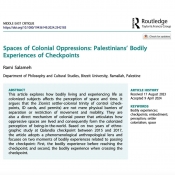Expert defines innovative countermeasures for wrong-way driving
Haitham Al-Deek, a professor of civil, environmental and construction engineering at the University of Central Florida, discussed his research into combating wrong-way driving in a lecture held at Birzeit University on Monday, December 10, 2018.
In the lecture, attended by engineering and technology faculty members and students, Al-Deek said that the main reason behind his research efforts was a wrong-way driving incident with his wife, during which a speeding car almost hit her.
Due to the increasing number of wrong-way driving accidents, the Central Florida Expressway Authority contacted Al-Deek to conduct a six-month study on the causes of such incidents and countermeasures to prevent them.
As per the study Al-Deek conducted with his research team at the University of Central Florida, the leading causes of wrong-way driving are: driving under the influence, suicidal tendencies, and unintentional mistakes.
As part of the study, 54,000 people in Orlando, Florida were surveyed on whether they reported wrong-way drivers to the police. Only 10 percent of them said they did, Al-Deek commented, noting that such a problem was “severely underreported.”
The countermeasure that was developed by Al-Deek and his research team, and deployed provisionally by the Central Florida Expressway Authority, was a system that detects wrong-way drivers and alerts them using flashing signals. If the wrong-way drivers don’t stop, then cameras take a picture of their cars and send it to the local police department.
Because the budgets of local transit authorities are somewhat constrained, Al-Deek and his team have also developed a wrong-way drivers hotspot modeling and optimization system, which predicts where wrong-way driving crashes will occur through two models.
The first model analyzes crashes, citations, and 911 calls to predict an optimum location for the wrong-way driving detection system, while the second model analyzes the number of major directional interchanges per mile and the number of 2- to 3-leg directional interchanges per mile.
Al-Deek has over 30 years of experience in designing, analyzing, and testing intelligent transportation systems. He has published hundreds of peer-reviewed research papers and has supervised dozens of master’s and Ph.D. theses.







